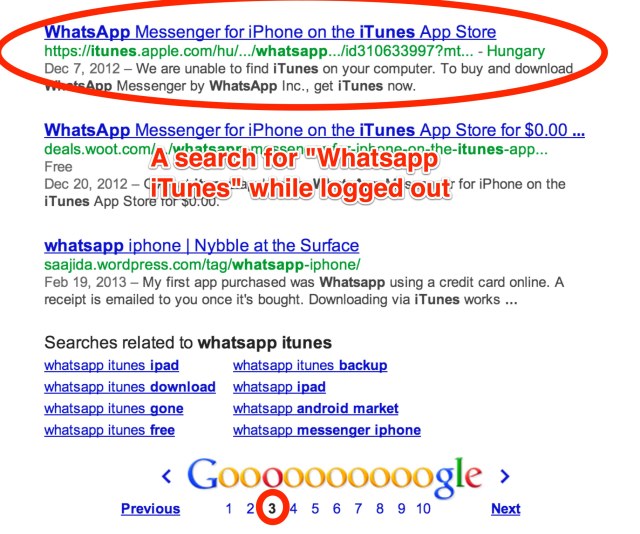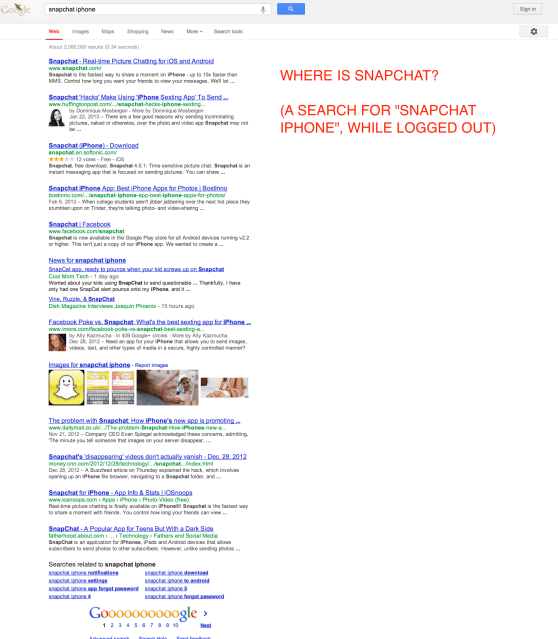Google search is making it more difficult to surface iOS applications using typical user queries, like “Whatsapp iTunes,” “Whatsapp iPhone,” or searches by app name, for example. In the past, this would return a page of search results where the iTunes URL would be ranked highly. Today, those links are further down in Google’s results pages.
In Whatsapp’s case, the iTunes URL doesn’t even appear until close to the bottom of the second page of search results, when logged in while searching for “Whatsapp iTunes,” and it’s at the bottom of page 3 when logged out. It’s even more difficult to find it using “Whatsapp iPhone,” whether logged in or out.
This is but one example, of course.
The search penalty, or search bug if that’s the case, doesn’t seem to affect all apps to the same degree. And the rankings also depend on what search terms are used, and whether the user is signed in.
For instance, while logged in, a search on Google for “Twitter iTunes” returns the iTunes URL in spot #8, below several links to iTunes Twitter accounts. Meanwhile, a search for “Twitter iPhone” returns the iTunes URL in spot #5 (not counting Twitter images results). Previously, the iTunes Twitter URL would rank much higher – often in the top #1 or #2 positions.
But it’s important to note that the above were how apps were ranked while being logged in, meaning signed into a Google account. Because this has long since affected search rankings, we ran the same search as a logged out user. That returns nearly the same in Twitter’s case – #9 (+iTunes) and #5 again (+iPhone).
Still, Twitter’s iTunes URL still appears on page 1 using these queries, which is not bad. However, not all apps are as lucky.
The app search results are very inconsistent. Appending ” iTunes” to the search query often appears to be necessary in order to see the iTunes URL returned to the top spot, which has long been a trick savvy Google users know to use to get the results ranked higher. It’s unclear then, what, if anything, has changed in that regard besides the high-profile examples involving Whatsapp and Twitter above.
Meanwhile, queries for “app + iPhone” are poorly ranked in some cases, while just the app name alone often leads to no iTunes links in top search results, or even top pages.
For comparison’s sake, here are some sample queries, run both while logged in and out of Google. Obviously, if you run the same queries while logged in, your results will differ.
Some of the odder examples are in bold.
“App Name” queries:
- Snapchat: Logged in or Logged out – can’t find iTunes URL after several pages in; while Logged out gave up after page 15
- Flipboard: Logged in – #5 / Logged out – #6
- Tweetbot: Logged in – #6 / Logged out – bottom of page 4!
- Alien Blue (a popular Reddit app): Logged in – not on first 2 pages of results / Logged out – not on first 2 pages of result
- Angry Birds: Logged in – not on first 2 pages of results / Logged out – not on first 2 pages of results
“App + iPhone” queries:
- Snapchat: Logged in – not on first 2 pages of results / Logged out – near bottom of page 2
- Flipboard: Logged in – #1 / Logged out – #1
- Tweetbot: Logged in – not on first 2 pages of results / Logged out – bottom of page 4
- Alien Blue (a popular Reddit app): Logged in – 2nd link, page 2 / Logged out – 3rd link, page 2
- Angry Birds: Logged in – #1 / Logged out – #1
“App + iTunes” queries:
- Snapchat: Logged in – #1 / Logged out – #1
- Flipboard: Logged in – #1 / Logged out – #1
- Tweetbot: Logged in – #1 / Logged out – #1
- Alien Blue (Reddit): Logged in – #1 / Logged out – #1
- Angry Birds: Logged in – #1 / Logged out – #1
TNW has posted other high-profile examples here, but it’s unclear from the screenshots whether those searches were performed while logged in or out. (Update: spoke to the post’s author, and he confirms they were performed while logged out).
For most apps, adding “iTunes” works to deliver the iTunes URL results, whether logged in or out. It’s the other types of queries that are difficult, and it’s difficult to pinpoint an exact time when these changes began. Because Google is constantly refining its algorithms, and many users are on Google while logged in, tweaks to search rankings are rarely spotted immediately, unless it’s a case where a URL has been banned entirely, whether or purpose or by accident. (As was the case with Digg, recently).
However, AppsFire co-founder Ouriel Ohayon says while he only first noticed the issue today, he tells us that he was doing some app research on Google two weeks ago, and the rankings were quite different then. Hillel Fuld of Inneractive confirms he’s noticed the same issue for a few weeks now, with fewer and fewer apps appearing in top results, making it more difficult to find the apps he’s searching for using typical queries.
Ohayon says that the changes do matter. “There are still a substantial number of users who use Google for all kinds of search, including their apps,” he says. “It would affect the way people discover apps.”
We’ve reached out to Google for clarification on this, and will update if it offers comment. Currently it’s too soon to call this out as either a new or significant iTunes penalty, despite some odd results and the comments from app industry pros. Reach out if you have more to add.
Update: Though Google never responded to our request for comment, it did provide this statement to others this evening, including Search Engine Land:
We’ve been having some issues fetching pages from the iTunes web servers, and as a result some people may have had problems finding iTunes apps in search easily. We’re working with the team there to ensure search users can find what they’re looking for.

